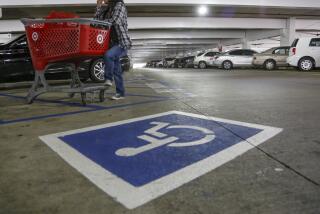His handicap placard doesn’t work in Europe
- Share via
Question: While traveling in Britain this past summer, I parked my car in a Scottish parking garage and went to explore a shopping mall. When I returned to my car, I had received a ticket for parking in a designated disability spot, even though my California handicapped parking placard was prominently displayed. Officials told me the placard was either a fake or not valid. I received a fine of about $130. If I didn’t pay it, I would be taken to court. I had checked before I left the U.S. and was assured my placard would work. What could I have done?
Bryan Frame, Calabasas
Answer: When I contacted VisitBritain, Katrina Sutton, a spokesperson, said Visit Scotland had offered to reimburse Frame for his parking fine.
Britain’s system that allows drivers to park in designated spots is called the Blue Badge Scheme. The “badge” is recognized in countries that belong to the European Union and some other partners.
But “there is no reciprocal arrangement for countries outside [Europe] with regard to recognizing disabled badges,” said Brian Seaman, a representative for Tourism for All, a British nonprofit that provides information for disabled travelers. Seaman said his organization had been in touch with Britain’s Department of Transport to see whether the regulations might be changed “particularly in the run-up to the 2012 Olympics and Paralympics” but added that changes, if they occurred, would come slowly and probably not in time for the big event.
“It would be embarrassing if the first thing that happens [to a disabled traveler] would be to get a ticket,” he said. “That’s not very good PR.”
You have to love the British penchant for understatement.
You don’t have to love the lack of information on how U.S. travelers can get a placard. Indeed, it took me more than a dozen phone calls and e-mails to get an answer (Seaman responded immediately). Seaman said travelers would need to “make arrangements locally” to make sure their placard is recognized but noted that travelers going to more than one place would find a hassle. For information: https://www.direct.gov.uk/en/DisabledPeople/MotoringAndTransport/Bluebadgescheme/DG_4001061.
Also check with a rental car agency, said Lex Frieden, professor of biomedical informatics and rehabilitation at the University of Texas Health Science Center and a wheelchair user. When he rents in Britain, the “rental company has provided me with the needed documentation and placards,” he said.
Are the Brits hardhearted? Durant Imboden, of the website Europeforvisitors.com, sees this as more a legal matter. “While the Scottish parking warden could be faulted for a lack of kindheartedness, one could also argue that the warden was simply enforcing the law so that handicapped-parking spaces would be available to Blue Badge holders,” he said in an e-mail to me.
Indeed, in September the Daily Mail newspaper reported that of the 2.5 million badge holders, as many as half “may be used by those who don’t need them” and that stolen badges are sold on the black market for nearly $2,500. Various British papers are filled with stories of able-bodied people who use the badges to get better parking places. (Of course, nothing like that ever happens in California.)
Seaman thinks the issue of what’s allowable really boils down to common sense. “Sometimes we have it and sometimes we don’t,” he said of his countrymen.
Perhaps the best advice comes from Scotland’s publication on the Blue Badge (https://www.scotland.gov.uk/Publications/2007/03/28155511/1): “If in doubt at any time, you should check with the Local Authority.”
That’s common sense that could keep anyone out of court.
Have a travel dilemma? Write to travel@latimes.com. We regret we cannot answer every inquiry.
More to Read
Sign up for The Wild
We’ll help you find the best places to hike, bike and run, as well as the perfect silent spots for meditation and yoga.
You may occasionally receive promotional content from the Los Angeles Times.







